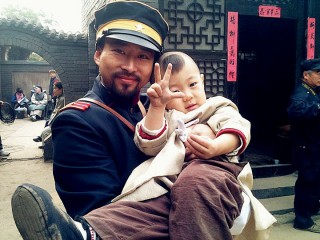Loading
Search
▼ Japanese actors die a thousand deaths in China’s film industry
- Category:Other

JAPAN TIMES
With his warm smile and shy demeanor, actor Hirotaka Tsukagoshi doesn’t look like a villain.
But as he gets into character, lowering his voice to a demonic growl and arching his eyebrows into a cinematic expression of cruelty, you begin to see hints of the man who has raped, murdered and pillaged his way through almost 30 Chinese movies and television shows.
The 36-year-old is one of about a dozen Japanese actors who make their living in the country’s entertainment industry as “Japanese devils,” China’s slur of choice for WWII-era invaders.
Tsukagoshi started out in 2005. In his first role he played a lieutenant who was executed by the Japanese army.
“They pushed me out into the snow in my underwear and burned me to death,” he said. “That’s when I first truly felt like an actor.”
His big break came while filming on location in rural China.
With the cameras rolling, an elderly woman, a local resident recruited as an extra, began to strangle him.
“I didn’t know if it was part of the script or not, so I just went with it,” he said. “Just when it really started to hurt, the director yelled ‘cut.’ “
The woman, Tsukagoshi later learned, had witnessed the Japanese occupation.
“She was crying and choking me at the same time,” he said.
The director was so impressed with Tsukagoshi’s performance that he gave him a contract the very next day.
It was an invaluable introduction to a thriving industry.
In 2012 alone, Chinese companies made more than 200 productions about the occupation, a period lasting from 1937 to 1945 and known in China as the “War of Resistance against Japan.”
Since then, strained relations between the countries over the Senkaku Islands and Japan’s attitude toward the war have made business even brisker.
In 2014, Tsukagoshi has appeared in four productions and is now filming a television show in Beijing. He says it is one of his best years to date.
“Japanese devils” have appeared in Chinese war movies since the 1950s. But in the genre’s early years, Chinese actors filled the roles, sometimes fitted out with buckteeth and thick glasses in accordance with the stereotypes of the day.
Japanese actors did not begin regularly appearing in the films until the late 1980s, said Timothy Tsu, a professor and expert on Chinese cinema at Japan’s Kwansei Gakuin University.
At the time, China was trying to improve relations with Japan and made a series of films emphasizing the wartime suffering experienced by ordinary people in both countries.
While Chinese actors continued to play most parts, assigning Japanese performers to key roles made the productions more international — and more believable.
“They talk differently. They bow differently. They even stand differently,” says Xi Xi, a casting agent who has worked on television programs for China Central Television (CCTV).
But the era of good vibes was short lived.
By the early 1990s, “Japanese devils” were back, and worse than ever.
While depictions of Japan’s war crimes were “almost entirely absent” from Chinese films about the war made during the Mao era, today’s films feature “very graphic and even exploitation-type depictions of Japanese violence,” Wu said.
The reason for the change, he believes, is “both commercial and political.”
On one hand, “you have an audience out there that would soak up any anti-Japanese action movie.” On the other, the government’s “very strict controls” on the movie industry mean that “people just fall back on this, quote unquote, safe topic.”
Chinese viewers, Tsukagoshi says, sometimes have difficulty separating the violent fantasies from reality.
A Chinese fan once posted a comment on his blog praising him for “teaching people about history.”
He quickly set her straight.
“You can’t learn anything from this stuff,” he wrote back. “It’s just entertainment.”
He takes no responsibility for the effects his work might have on Sino-Japanese relations, but he does hope it will help people understand that “war is bad.”
The thought is not as far-fetched as it might seem. Although the “Japanese devil” remains a popular stock character, portrayals of the soldiers have become more nuanced over the years.
In the 2009 dark comedy “Cow,” Tsukagoshi played a meek Japanese private who helps a Chinese peasant care for a sick cow. He is a college student who loves his family and crickets.
But some things never change. The character is ultimately shot to death.
“I almost always die,” Tsukagoshi said. “My mom won’t watch anything I appear in. She hates seeing me get killed.”
China, on the other hand, can’t get enough.
- December 17, 2014
- Comment (0)
- Trackback(0)

